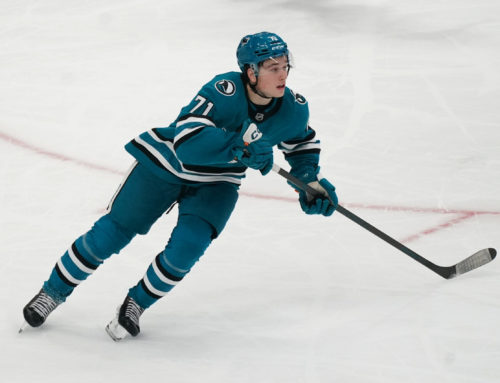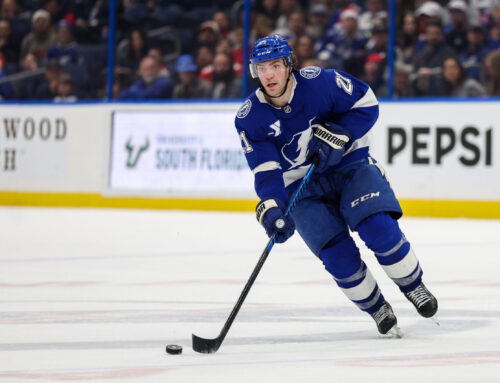
Remember how all along I said there would be at least three summer Cage Match Tournaments? Well, after a break to celebrate Bubble Keeper Week, I’m back with a fourth Tournament, this time to focus on up-and-coming defensemen.
Cage Match Tournament #4 – Breakout Unproven Defensemen
For this tournament, you’re going to vote on which defenseman (or defensemen) – who has/have never previously scored 40 or more points or had a 40+ point scoring rate – will beat his/their career high in points (or scoring pace) by 10+ points in 2018-19. The 18 choices are listed below, along with their previous career high. As with the second and third Tournaments I’ve included a “none of the above” choice in case you believe none of them will meet the criteria to merit your vote.
Voting Rules and Guidelines
Yet again you can vote for as many or as few players as you want – just be sure every player you’re voting for is someone you realistically see as someone who’ll beat his previous career high in points (or scoring pace) by at least ten in 2018-19. Since we’re dealing with actual points being scored, once again Band-Aid Boy status and injury history are negatives, since if a player is prone to getting hurt then he has less chance to outscore his prior career high.
Beyond that, and as also was the case in all prior tournaments, make sure to vote with your head more than your heart. That means you should mainly bear in mind objective factors affecting one’s scoring, like contract status, likelihood of being traded during the season, and individual/team situation. You can still use instincts and hunches; but keep in mind your fellow Dobberites will look at the voting results for crowdsourced fantasy guidance, so don’t – for example – vote for someone for “good karma” simply because he’s on your team or not for someone else because he’s on the squad of your chief rival. The idea is to enjoy yourself, but also have the results be meaningful.
Once again voting will take place in the Dobberhockey forums. I’ll put a direct link at the bottom of the column. Now without further ado, here are your voting choices (in alphabetical order):
Thomas Chabot (Previous career high scoring pace = 32 points)
As I write this, Erik Karlsson is still a member of the Ottawa Senators. But chances are he might not be when the 2018-19 campaign begins, with Chabot a big beneficiary even if another defenseman comes to Ottawa as part of the deal. Chabot used last season to get a full taste of NHL action, and, in contrast to the rookie wall many first year players hit, got better with each quarter, culminating in ten points in 24 games to end the season while taking the ice for 42% of Ottawa’s PP time and for nearly 20 minute per game overall. With Chabot, the question is less so whether he’ll break out, but when. Despite the Sens looking poised for another poor season, Chabot would be a top option for blueline offense right away once Karlsson is shipped out of town. Even on a bad team, that is a recipe for points.
Jakob Chychrun (Previous career high scoring pace = 24 points)
Unlike Chabot, Chychrun fared worse as the season – his second – wore on. Yet he still made key strides overall, including his per game power-play time doubling to 2:02 and his overall ice time clearing the 20 minute mark. He also saw his SOG rate climb significantly to more than two per game. All signs are pointing to a major jump in scoring, and it could come as soon as this season, especially if Arizona’s young nucleus starts to gel as expected.
Aaron Ekblad (Previous career high scoring pace = 39 points)
When he nearly hit the 40 point mark in his age 18 season in 2014-15, few thought he’s still have yet to clear that threshold after three more campaigns. And although many will see his 2017-18 output of 38 points and figure he failed in his magical fourth season, his totals don’t come close to telling the full story, as 26 of those 38 points came in his final 43 games. Yet before we take that and get too carried away, he was still seeing the ice for roughly only a third of Florida’s PP time and his normally high SOG rate cratered, such that he finished with 36 fewer SOG in 2017-18 versus 2016-17 despite playing in 13 more games. This is a tough vote, since some signs point toward a big scoring spike while others are indicating that he might be lucky to keep his points total above 35. Your votes hopefully will help point your fellow Dobberites in the right direction when it comes to predicting Ekblad’s 2018-19 output.
Mattias Ekholm (Previous career high scoring pace = 35 points)
Although if you read my cage match from June on Ekholm, you saw how there’s no precedent for a team with four defensemen each scoring 45+ points, so that would seemingly make Ekholm’s quest for that number next to impossible due to the high scoring and more favorable deployment of Roman Josi, P.K. Subban, and Ryan Ellis. Yet as we saw when Ellis was hurt, Ekholm can score at a 45+ point pace (13 points in his first 20 games). so if somehow one of Nashville’s “big three” gets injured or even traded (as had supposedly been rumored for Subban in the spring), then suddenly Ekholm gets a chance to once again strut his stuff. Injuries and trades do happen, so perhaps on that basis Ekholm merits your vote?
Samuel Girard (Previous career high scoring pace = 24 points)
As we see from some of the other voting choices, it’s rare for a young defenseman – even one as highly touted as Girard – to connect the dots by his second season. Yet the supremely talented Girard could have it in him to improve enough to deserve your vote, as although his SOG rate was low and he took the ice for under 18:00 per game last season, his last five regular season games each featured him receiving 20:00+ per game and he fired a total of ten SOG in those contests, posting two points. Stretch that into a full season and he’d coast to at least 32 points. The question for you to decide in casting your vote is whether Colorado is ready to commit to Girard to that extent over an entire campaign.
Noah Hanifin (Previous career high scoring pace = 33 points)
If Hanifin can produce what Dougie Hamilton did, then 43 points would be a walk in the park. Where concern arises is Hanifin was having a difficult time getting regular PP time in for the Hurricanes, so what will happen now that he’s the Flames, who have more options? With Hanifin set to enter his magical fourth year right after Mark Giordano and T.J. Brodie posted only 21 PPPts between them, there might be a chance for Hanifin to seize the PP reins and, in doing so, see his points total spike to 43+.
Oscar Klefbom (Previous career high scoring pace = 38 points)
After portions of three seasons with the Oilers, Klefbom landed squarely on fantasy radars in 2016-17 with 38 points. As was the case with most Oiler skaters, much was expected of Klefbom for 2017-18; and like many of them, he fell short, managing 21 points in 66 games. But for each bad sign (like only 6 PPPts) there was a positive, like him equaling his 2016-17 SOG total in 16 fewer games. The concern lies in whether the Oilers trust Klefbom to be their top guy, including on the PP. It’s seemingly his spot to lose for now; so if the Oilers revert back to their 2016-17 ways, he could have huge point totals.
Esa Lindell (Previous career high scoring pace = 28 points)
Last season Lindell made strides in the points department, plus saw his average PP Time per game rise by 50%. And he was cruising along on his way to 30+ points until he limped to the finish with a mere four in his last 21 games. If Erik Karlsson comes to Dallas, then Lindell becomes an immediate fantasy afterthought; however, if that doesn’t happen we could see Lindell continue to progress and, with that, tally even more points, perhaps even a lot more despite John Klingberg remaining top dog when it comes to the Dallas blueline.
Josh Manson (Previous career high scoring pace = 38 points)
Last season Manson, at age 26, came from nowhere to post 37 points, easily besting his combined total from his last two seasons. And he did it without scoring a single PPPt, which right there is the big wrinkle. If Manson is unable to break into the PP rotation, he’s unlikely to equal – let alone surpass – his scoring output from last season. Yet if he can continue his offensive showcase the Ducks might just try him on the PP, where if he clicks he could outpace even his surprising stats from last season.
Mike Matheson (Previous career high scoring pace = 27 points)
For the time being Matheson is a third wheel when it comes to defenseman scoring, behind Ekblad and Keith Yandle. Yet the Panthers certainly think highly of him – highly enough to ink him, last October, to an eight-year deal paying him just under $5M per season. And with that kind of money usually comes more ice time and responsibility, which is exactly what occurred, with his power-play time doubling to more than a minute per game and his overall time per game climbing by nearly a minute to 21:20. The question is whether Florida can become a dynamic enough offensive team to support three d-men all scoring at or above 37 points.
Brandon Montour (Previous career high scoring pace = 33 points)
Unlike Manson, Montour already figures prominently in the PP equation for the Ducks, seeing the ice for more than 50% of the team’s time with the man advantage and jumping from 17:28 per game overall in his first season to above 20 minutes per game in 2017-18 and responding with 32 points. With Shea Theodore now gone, and neither Cam Fowler nor Hampus Lindholm representing a true PP QB, Montour has a chance to step up and grab the job, and, with that, the points boost that would come with it.
John Moore (Previous career high scoring pace = 28 points)
Although Moore was not signed for his offense, the B’s have a history of players (like Dennis Seidenberg) who, although defense first in their mentality, also put up nice points along the way for the team. And Moore could be the next in that line, especially if he gets some PP2 time and plays more than 20:00 per game for the high-scoring Bruins.
Darnell Nurse (Previous career high scoring pace = 26 points)
Although visions of Nurse being a dominating d-man, with ample points and punishing defense, have not come to fruition as yet, he enters 2018-19 with a shot to grab the PP1 job, especially if Klefbom falters. Although Nurse only had 26 points in 2017-18, he had six multi-point games, which shows he can score in bunches. And if we count his 44 game 2016-17, this would be his magical fourth season, so between that and a rebound for the Oilers we could be in for a breakout that takes him to 36+.
Dmitry Orlov (Previous career high scoring pace = 33 points)
The groans you heard back in early July were from Orlov owners when John Carlson re-signed, since that likely meant Orlov would remain on the outside looking in when it came to PP1. This despite Orlov being a dynamic puck mover and otherwise skilled enough to be a PP QB. Still, the Caps still have enough firepower to score in droves, and with the ice time and PP2 role that Orlov has that could be the recipe for him to score in the 40s.
Ryan Pulock (Previous career high scoring pace = 38 points)
After ending last season with 24 points in 40 games, all Pulock would need to do is keep up that pace in order to best his career high by ten. So should you stop reading now and vote for him? Not so fast. As was discussed in last week’s Bubble Keeper edition of Goldipucks, Nick Leddy is still “the guy” in New York, with Pulock taking the ice for 50% of New York’s man advantage minutes in a mere six of his 68 games last season. Still – Pulock could do what Matt Dumba did in Minnesota last season, which is force the issue enough for there to be two top defensemen scorers in town.
Damon Severson (Previous career high scoring pace = 32 points)
Still only 23, it seems like Severson is even older, likely because he’s already played 279 NHL games and will be entering his fifth season in 2018-19, although you could count it as his magical fourth if you look past the 51 contests he played in 2014-15. Thus far all poolies have to show for patience with Severson is one season above 24 points. And now Sami Vatanen and Will Butcher have entered the equation as go to options for d-men points. Yet Severson still managed 15 points in his last 38 games and it wouldn’t be the first time a young d-man finally blossomed once the spotlight was shining less brightly on him.
Nate Schmidt (Previous career high scoring pace = 39 points)
Although Colin Miller and Shea Theodore will likely duke it out for top PP minutes in Sin City, Schmidt is poised to be the defenseman anchor for the Knights, with the higher ice time to show for it and some PP scraps. If the Knights continue their high scoring ways there should be enough points to go around such that Schmidt will cruise pass the 40-point mark and maybe even make a run at 50.
Shea Theodore (Previous career high scoring pace = 39 points)
As noted above, Theodore stands to battle it out with Colin Miller for top dog PP minutes in Vegas. And after posting 21 points in his last 39 games, with ten of those coming in the playoffs thanks in large part to over three minutes per game of power-play time, Theodore might have the inside edge. Always a highly touted prospect, Theodore is getting a chance to strut his stuff and looks to be making the most of it, so a major breakout could be in the cards.
. . . . . . . . . .
There are your 18 voting choices (19 if you count “none of the above,” which once again I’ll list as a choice as well). Remember, you can vote for as many or as few of the 18 as you think will actually score 10+ points higher than their previous career best in 2018-19. To vote, click here.
As with last week, when voting, be sure to also post in the thread about which player(s) you chose to vote for and why, as that way your fellow Dobberites can get better insight into your thought process and the Tournament can be as instructive as it is fun.





 DAL
DAL EDM
EDM MIN
MIN BUF
BUF CAR
CAR DET
DET NSH
NSH
